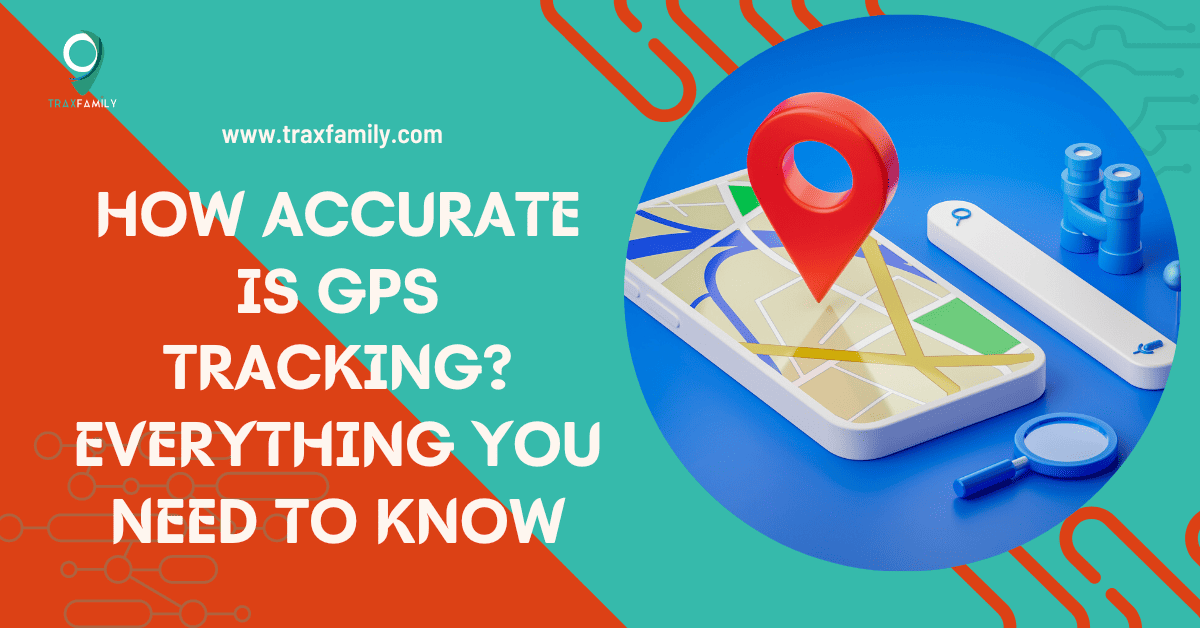Do you want to know if your kids have safely reached home? Do you want to track the location of your business delivery truck? Or do you want to keep an eye on your pet while you are away?
GPS tracking technology could be the solution to these requirements. GPS-powered devices like portable and hardwired trackers provide you with real-time location information.
You can know the exact location of your loved ones or assets through an app, web platform, or email and text alerts.
But how accurate is GPS tracking? Modern-day GPS devices claim to offer accuracy within a range of 3 to 15 meters under the open sky. Several factors, though, like buildings, dense trees, and radio interference, can affect GPS signal strength.
Today, we will explore GPS technology and its applications, how accurate GPS tracking is, and how you can improve accuracy.
How Does GPS Tracking Technology Work?

GPS technology uses a satellite network to locate an object or individual on the Earth. These satellites transmit signals with their current location and time. Devices like smartphones and GPS trackers have built-in GPS receivers which receive and process these signals.
The devices use a process called trilateration. The process uses data from at least three satellites to determine location and time information.
The way the information is presented to you depends on the type of device. For example, most GPS trackers have apps using which you can monitor the tracker along the way while it is in motion.
Some trackers let you know the current location through email or text alerts. The information is also stored away so you can view historical device activity.
How Accurate is GPS Tracking?
The GPS project was first started by the US DoD in 1973. The civilian use of the technology was permitted in the 1980s. But up until the 1990s, the US Government had control over GPS accuracy.
They had a project called Select Availability, using which they could degrade or completely deny access to the GPS. The project was discontinued in 2000, and the technology was made available to all.
When the project was discontinued, GPS had an accuracy of 5 meters. Devices like smartphones have an accuracy of 4.9 meters under the open sky.
Then you have high-end GPS devices with good receivers that can pinpoint a location within a 30 centimeters radius. This accuracy can further be improved with the use of dual-frequency receivers.
Some GPS trackers also use alternative technologies like Bluetooth and Wi-Fi to provide location details. For example, if the GPS device is paired to your smartphone, it will use your smartphone’s GPS to determine the location.
If you are indoors and your GPS device has access to Wi-Fi, it will use the Wi-Fi positioning system (WPS) to determine location. In this case, the accuracy could be around 10 to 50 meters range.
When you buy GPS trackers, look at the technologies it employs and the accuracy it offers.
Why Does GPS Sometimes Show a Wrong Location?

Several factors can affect the GPS accuracy of a device. The accuracy could be off by a few meters or show you the wrong location altogether.
One of the common causes of poor GPS signal strength is obstructions caused by tall buildings, trees, mountains, and bridges. Placing a GPS tracker under the open sky works best for the most accurate location details.
Radio interference and solar systems are less likely to happen, but they could also be reasons why your GPS device shows a wrong location.
If your GPS device is damaged, it will not work as expected. Thus you should invest in protective cases, especially for small portable GPS trackers.
The GPS device software could also be an issue. For example, companies will offer software and map updates to fix problems, improve performance, and get updated location details.
If you miss these updates, your device will be running on outdated information, which can lead to incorrect location and routing.
What Are The Different Applications of GPS Tracking?
Accurate GPS tracking can provide you with peace of mind. You can know where your loved ones are. You can use GPS data to optimize your business logistics.
Here are some common applications of GPS tracking.
1. Track Your Family

You can use portable GPS trackers to track your kids, teens, or elderly parents. These trackers can provide their real-time location. Some are equipped with voice monitoring so you can hear what is going on around the device.
Some include an SOS button that lets your loved ones reach out to you in an emergency.
2. Asset Tracking
GPS trackers are capable of detecting movement. So, if your asset moves, it will provide an alert with its current location.
Portable GPS trackers with good battery life are ideal for asset tracking.
3. Fleet Tracking

As a business, you can track all your vehicles using a single account. These GPS tracking devices can offer frequent updates, like once every 5 seconds to once every hour or two.
You can monitor drivers’ routes, idle time, and parking spots. You can use this information for better scheduling and delivery times.
4. Personnel Tracking
If you have employees working in the field, you can use GPS trackers to know their location. If they work in particularly difficult terrains, you can reach out or rescue them quicker in case of emergencies.
With real-time location details, you can let customers know when their packages will be arriving, improving user experience.
5. Vehicle Tracking

If your teen has recently started driving, you can use OBD or hardwired GPS trackers to monitor their locations.
These trackers are capable of offering details like speed, direction, mileage, and other aggressive driving behavior alerts like rapid acceleration and harsh braking. You can use these alerts to educate your teens on safer driving practices.
What Can You Do to Improve GPS Accuracy?
As we have seen above, several factors can affect GPS accuracy. You cannot eliminate every cause, but here are some tips that can help.
Be smart with tracker placement. For example, if you are using a portable tracker in a car, place it under the dashboard, inside the glove box, inside door compartments, or under seats. Avoid enclosing the device in metal from all sides, as this will hamper tracker performance.
Consider buying magnetic mounts so that you can attach the tracker to a metal surface. This works for vehicle and asset tracking.
When tracking people, select small and lightweight trackers that can be easily carried in backpacks and purses and worn around necks using lanyards.
If it is a battery-operated tracker, ensure it is always charged. Keep the tracker software updated.
FAQ’s
If we talk about consumer devices like smartphones and GPS trackers, 100% accuracy is currently not possible. The best accuracy you may get is around the 5 meters mark.
GPS technology does not work well indoors. In the case of outdoor applications, GPS signals cannot pass through objects like concrete walls, bridges, or dense vegetation. Portable GPS devices may have to be charged regularly, as frequent updates can drain the battery.
GPS has a slight upper hand over GLONASS if we consider location accuracy. But due to the positioning of the GLONASS satellites, it performs better in higher latitudes. For everyday applications like vehicle tracking, GPS should work for you.
As walls can block GPS signals, they are best not used for indoor applications. If indoor tracking is a priority, opt for GPS devices that also support Bluetooth and Wi-Fi tracking technologies.
Summary
GPS tracking technology can help you track your loved ones, vehicles, fleet, and assets.
So, how accurate is GPS? The answer to the question depends on several factors. In general, GPS devices under open sky can provide a location accuracy of around 5 to 10 meters.
Factors like tall buildings, bridges, trees, and mountains can block GPS signals. Faulty hardware and software can also negatively affect accuracy.
To improve GPS accuracy, place the device in a position where it can face the open sky. Do not enclose the device in metal boxes. Ensure the device has a sufficient battery or is connected to a power source.

Carson Harris is a highly qualified author and expert in GPS tracking technology. With a background in electrical engineering and machine learning, he has established himself as a trusted source of information. Carson’s work experience at Garmin and Panasonic has further enhanced his expertise. He possesses creative skills in website design and AI applications. Known for his clear and concise communication, Carson’s articles on Trax Family’s website provide valuable insights on GPS trackers.

